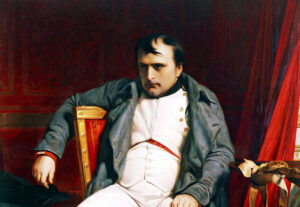When men make history, Karl Marx observed, it is not under circumstances of their own choosing, but rather under circumstances given and inherited from the past. History is the one thing we cannot escape; the great epochal force which creates the world in which we live, as well as being the story we use to understand it.
I thought of this as the results of the by-elections trickled in this morning, the Tories coming within a few hundred votes of losing all three seats in what would have been an unusually uncaveated rebuke. When trying to assess whether or not yesterday’s by-elections prove that the Government is destined to defeat, we cannot help but turn to historical precedent. Never has a Labour opposition overturned a majority as big as the one in Selby, we read; Rishi Sunak has only just avoided becoming the second prime minister in history to lose three by elections in one day (after Harold Wilson in 1968). Labour leader Keir Starmer reacted to the overnight results as you would expect: they were “historic”, he said.
The results come hot on the tails of Starmer’s public embrace with Tony Blair in the bowels of London’s Park Plaza hotel this week, in which the Labour leader consciously mimicked his predecessor by declaring the country needed three things: “Growth, growth, growth.” Unless anyone missed the obvious nod, Starmer moved quickly to acknowledge it. “Now you may have heard a refrain like that before,” he joked, to knowing laughter.
In some senses, this whole week has felt like a theatrical passing of the baton; exiled king recognising his rightful heir and receiving his blessing in return. Starmer had done what was necessary to win power, Blair declared. The audience whooped and cheered in what seemed like a moment of genuine catharsis, a sudden outpouring of relief. Starmer was one of them. The Pope had given his blessing. In turn, Starmer had used the occasion to show he was as determined as il Papa to win power for them, taking the tough decisions necessary to do so. Blair nodded on approvingly.
It is not surprising that, in Westminster, many conversations turn back to Blair when assessing today’s politics — the perennial question of whether the next election is going to be a rerun of 1997 or 1992. Is Starmer the new Blair? Or the new Kinnock? This, after all, is the dominant political fable of our time, the simple, easy-to-understand morality tale of modern British politics.
The story usually runs something like this. In 1992, Kinnock had almost done enough to win, but not quite enough. The party was still too Left-wing. The Tories, in contrast, had done what was necessary to cling to power by replacing Margaret Thatcher with John Major, allowing all those quiet Tories to secretly cast their vote for continuity. By 1997, however, not only had Major’s government imploded in a fireball of incompetence and sleaze, but Labour had finally chosen a man to win. This is the story of our time and retold in Tory form as the long march from madness from IDS to Cameron. Today, the question for many is whether Starmer has done enough to win over the public or whether he has left enough room for Sunak to pull a Major.
Yet, for Marx, the whole point was that history does not repeat — even in farce, as he joked. Each new era in history is different. Borrowing old battle slogans is not a way to resuscitate the conditions of the past, but a way of dressing up our modern challenges in “time-honoured disguise” to make them less daunting, turning scary, complicated problems into familiar ones. “Growth, growth, growth,” Starmer exclaims and everybody understands. What that actually means when it comes to, say, artificial intelligence wiping out millions of white-collar office jobs is anyone’s guess.
Ironically, I suppose, even Marx was kidding himself about the true scale of historical change, constructing a whole theory to explain how the chaotic process is actually one, long predictable journey towards the light. And yet what is perhaps most remarkable about today’s challenges is not their similarities to past decades, but their differences.
The challenge facing Starmer today is certainly closer to 1992 than 1997, in that he faces a sizeable Conservative majority rather than the marginal one Blair needed to overturn. But then, unlike 1992, Starmer faces a government which has presided over an economic crisis of its own making and so, in that respect, is more like 1997. In some ways, a closer parallel to either is actually 1964, another time a Conservative government with a huge majority found itself limping towards defeat under a new prime minister, by-election losses and scandals mounting up along the way, sapping all sense of hope from an exhausted party. This was before Wilson came in, only for him to become the man to lose all those by-elections in one day.
Once again, however, the differences are just as stark as the similarities. The recession of 1961 had been mild and the recovery reasonable. The Sixties today are notable for being a decade of sustained economic expansion with rising living standards for all. This is very much not the case today. If anything, our own period is closest to the Thirties following the Wall Street Crash.
Starmer certainly seems aware of the limitations of comparisons with the past. Speaking alongside Blair on Tuesday, he noted that even if he matched the swing to Labour that Blair managed in his landmark victory, his majority would amount to a single solitary seat. Perceptively, Starmer also acknowledged that the mood of the country was very different from 1997. Today, the feeling is less Things Can Only Get Better and more Things Can Hardly Get Worse. In fact, in one important but overlooked comment, Starmer said that unless the next government proved it could turn things around, this sense of national pessimism would turn into a kind of lethargy, It would, he said, “gnaw away at our collective sense of collective purpose and push us towards a learned political hopelessness and a mindset of decline”.
Here, Starmer alighted on one of the great — and worrying — differences between today and much of our recent modern history. In the Sixties, there was economic growth and a sense of possibility: the great white heat of technology, modernisation, Europe and all that — each an apparent answer to decline. Even in the Seventies, when the economic challenges seemed overwhelming at times, there remained, ironically, much more of a sense of hope than there is today. Without this hope, after all, there could not have been the radicalism there was — whether of the Bennite variety on the Left, or the Thatcherism of the Right, both of which believed they had the answers to the problems of the day.
The Seventies were a time, remember, when it was a national scandal if living standards did not rise each and every year and people took to the streets to protest if they didn’t. Today, there is a sense, it seems, that nothing matters. We have had 15 years of stagnant living standards, falling home ownership and deteriorating public services. Even Brexit, our great national revolution to shake the system out of its torpor, seems to have changed very little: immigration has continued to rise, the economy to stagnate, taxes to rise. We have taken a screenshot of what existed before, only a slightly worse copy. And yet, if anything, our politics have become less radical in this time, the answers to our stagnation becoming ever narrower and more timid.
Is our national lethargy a result of our political failure, or is our political timidity a reflection of our public despair? There’s a similar mood of despair in J.D. Salinger’s Franny and Zooey. Published in The New Yorker in 1955, Salinger’s central character, Franny, laments how “everything everybody does is so — I don’t know — not wrong, or even mean, or even stupid necessarily. But just so tiny and meaningless and — sad-making.” This seems to be the national attitude at the moment. Like Franny, everyone is just sick of “ego, ego, ego”, as she puts it, “of everybody that wants to get somewhere, do something”. After Blair and Cameron and Johnson (and certainly Truss), we’re sick of people trying to do things. But we’re also sick of those who never look like they’re capable of doing anything, such as May or, perhaps, Sunak and Starmer.
It is this kind of nihilistic lethargy Starmer is worried about and which could cost him the election. It is the same kind of nihilism you detect in Salinger’s other book, Catcher in the Rye, the great lament about change and phoney adults going around saying things they don’t believe in. “I’m always saying ‘Glad to’ve met you’ to somebody I’m not at all glad I met,” says Holden Caulfield. “If you want to stay alive, you have to say that stuff.” For the same reason, the public has grown tired of their politicians, turning instead to authentic phonies such as Trump or Johnson.
In Catcher, Salinger has this wonderful metaphor, as I read it, for the slow, unrelenting progress of history which we see in politics as much as life. Holden thinks about his sister Phoebe going to the museum that he went to as a kid: “I thought how she’d see the same stuff I used to see, and how she’d be different every time she saw it,” he explains. “It didn’t exactly depress me to think about it, but it didn’t make me feel gay as hell, either.”
To me, this is much like politics, forever and always changing, shaped by the politics of the past placed in glass boxes for us all to gawp at and draw inspiration from. “Certain things should stay the way they are,” Caulfield declares in one of the great conservative laments. “You ought to be able to stick them in one of those big glass cases and just leave them the way they are.” But you can’t, of course. That’s the point.
Politics would be easy if all you had to do is read a history book and find the right precedent to copy, but it’s not. History is like Phoebe, the same but always changing. The conditions which exist today are similar to the past, the challenges recognisable, but they are also unique, requiring something new. Keir Starmer is not the new Tony Blair. But that doesn’t mean he’s Neil Kinnock either.
Disclaimer
Some of the posts we share are controversial and we do not necessarily agree with them in the whole extend. Sometimes we agree with the content or part of it but we do not agree with the narration or language. Nevertheless we find them somehow interesting, valuable and/or informative or we share them, because we strongly believe in freedom of speech, free press and journalism. We strongly encourage you to have a critical approach to all the content, do your own research and analysis to build your own opinion.
We would be glad to have your feedback.
Source: UnHerd Read the original article here: https://unherd.com/





